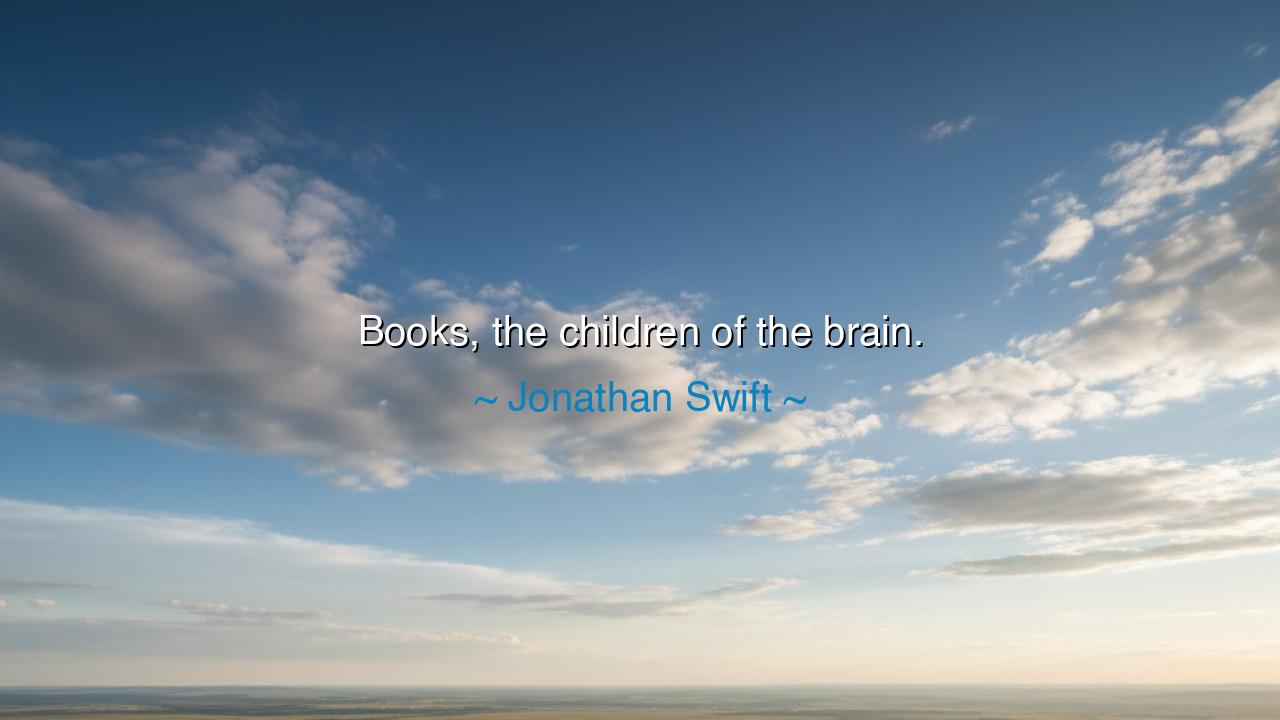
Books, the children of the brain.






In the wise and enduring words of Jonathan Swift, the great satirist and philosopher of the eighteenth century, we find a truth as tender as it is timeless: “Books, the children of the brain.” In this brief phrase, Swift unveils a vision both poetic and profound — that books are not mere objects of paper and ink, but living offspring of the human mind. They are born from the labor of thought, the anguish of reflection, and the yearning of the spirit to endure beyond mortality. As parents shape their children with love and discipline, so too does the mind labor to bring forth its ideas, giving them form and life in written words. And as children outlive their parents, so books outlast the minds that birthed them, carrying their creators’ voices through centuries.
To understand the origin of this insight, we must look into the soul of Jonathan Swift, author of Gulliver’s Travels, A Tale of a Tub, and The Battle of the Books. Living in an age of political upheaval and intellectual awakening, Swift was a man who wielded the pen as both sword and seed — a weapon against ignorance, and a vessel for wisdom. In “Books, the children of the brain,” he speaks from the heart of a writer who knew the agony and the glory of creation. He had seen how words could outlive the flesh, how a single thought, once written, could travel where no voice could reach. His “children” — his works — would go on to shape generations long after his own breath had ceased.
To call books the children of the brain is to recognize the sacred act of creation that takes place when the mind gives birth to thought. Every book begins as an invisible stirring in the depths of the soul — a spark, an intuition, a vision waiting to be born. It demands nourishment through contemplation, discipline through language, and patience through revision. The writer, like a parent, endures sleepless nights and moments of despair, laboring to give form to that which is intangible. And when at last the book is complete, it no longer belongs to its creator alone. It takes on a life of its own — misunderstood by some, cherished by others, but forever independent.
This truth is illustrated beautifully in the story of Mary Shelley, who, at the age of nineteen, conceived Frankenstein. In a stormy night of imagination, she gave birth not to a mere story, but to a new myth — a creation that would haunt and inspire humanity for centuries. Her book, like a child born of both intellect and emotion, grew beyond her control. It spoke to fears she could not have foreseen — of science, ambition, and the limits of human power. Shelley’s creation, though made of words, became as alive as the monster within her tale. Thus, she too proved Swift’s words: that books are the living children of the mind, capable of both beauty and terror, reflection and rebellion.
Yet, Swift’s statement carries a deeper wisdom still. For just as children reflect their parents’ virtues and flaws, so do books reflect the souls of their authors. A foolish mind gives birth to vanity, a cruel mind to poison, but a wise and compassionate mind gives birth to light. The world, therefore, is shaped not by the weapons of men, but by the offspring of thought — by the words that teach, heal, and awaken. The philosopher, the poet, and the historian are parents of civilizations, for their books build the unseen architecture of culture and conscience. To write, then, is not a trivial act; it is to partake in the creation of eternity.
However, Swift also reminds us that parenthood brings both pride and pain. For once a book is released into the world, it no longer belongs to its maker. Critics may twist it, readers may forget it, or generations may misunderstand it entirely. Yet the true writer, like the true parent, must accept this with grace. The duty is not to control the legacy of one’s creation, but to ensure that it was made in truth. In this humility lies the nobility of authorship: to give freely what was born within, trusting that somewhere, someday, it will awaken another soul.
The lesson, then, is both for writers and for readers. To those who create: treat your ideas as living beings. Nurture them with honesty, discipline, and care. Do not rush to deliver them before they are ready, nor abandon them when they are weak. And to those who read: remember that every book you hold is the child of a human mind — the voice of someone who once felt, dreamed, and struggled. Approach each page not with haste, but with reverence. For in reading, you converse with the dead and keep their spirits alive.
So, my listener, take heed of Jonathan Swift’s immortal words: “Books, the children of the brain.” Honor the written word, for it is the bridge between mortal thought and immortal truth. Every book is a birth, every idea a life begun anew. Write, if you must, not to be remembered, but to give life to what would otherwise remain unborn. For though the body perishes, the mind’s true offspring — its books, its ideas, its dreams — endure. And thus, in creating and in reading, we partake in the most divine of human acts: the creation of life everlasting through the power of thought.






AAdministratorAdministrator
Welcome, honored guests. Please leave a comment, we will respond soon